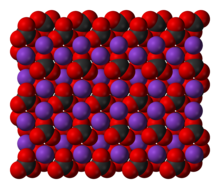15 Potassium Carbonate Solution Preparation
 | |
 | |
 | |
| Names | |
|---|---|
| IUPAC proper name Potassium carbonate | |
| Other names Carbonate of potash, dipotassium carbonate, sub-carbonate of potash, pearl ash, potash, salt of tartar, salt of wormwood. | |
| Identifiers | |
| CAS Number |
|
| 3D model (JSmol) |
|
| ChEBI |
|
| ChemSpider |
|
| ECHA InfoCard | 100.008.665 |
| E number | E501(i) (acerbity regulators, ...) |
| PubChem CID |
|
| RTECS number |
|
| UNII |
|
| CompTox Dashboard (EPA) |
|
| InChI
| |
| SMILES
| |
| Properties | |
| Chemical formula | One thousand 2 CO 3 |
| Molar mass | 138.205 g/mol |
| Appearance | White, hygroscopic solid |
| Density | 2.43thousand/cmthree |
| Melting point | 891 °C (i,636 °F; ane,164 Thou) |
| Humid signal | Decomposes |
| Solubility in water | 110.iiig/100 mL (20°C) 149.2grand/100 mL (100°C) |
| Solubility |
|
| Magnetic susceptibility (χ) | −59.0·10−half-dozen cmthree/mol |
| Thermochemistry[i] | |
| Rut capacity (C) | 114.4 J·mol−1·Thousand−one |
| Std molar | 155.5 J·mol−1·Grand−one |
| Std enthalpy of | −1151.0 kJ·mol−ane |
| Gibbs free energy (Δf G˚) | −1063.5 kJ·mol−ane |
| Enthalpy of fusion (Δf H ⦵ fus) | 27.half dozen kJ·mol−1 |
| Hazards | |
| GHS labelling: | |
| Pictograms |  |
| Point word | Warning |
| Hazard statements | H302, H315, H319, H335 |
| Precautionary statements | P261, P305+P351+P338 |
| NFPA 704 (fire diamond) | 1 0 0 |
| Flash point | Non-flammable |
| Lethal dose or concentration (LD, LC): | |
| LDl (median dose) | 1870mg/kg (oral, rat)[2] |
| Rubber data sail (SDS) | ICSC 1588 |
| Related compounds | |
| Other anions | Potassium bicarbonate |
| Other cations | Lithium carbonate Sodium carbonate Rubidium carbonate Caesium carbonate |
| Related compounds | Ammonium carbonate |
| Except where otherwise noted, data are given for materials in their standard land (at 25 °C [77 °F], 100 kPa). Infobox references | |
Potassium carbonate is the inorganic compound with the formula Thou2COthree. It is a white table salt, which is soluble in water. It is deliquescent, often actualization every bit a damp or wet solid. Potassium carbonate is mainly used in the production of lather and drinking glass.[3]
History [edit]
Potassium carbonate is the primary component of potash and the more refined pearl ash or salts of tartar. Historically, pearl ash was created past baking potash in a kiln to remove impurities. The fine, white powder remaining was the pearl ash. The showtime patent issued by the Us Patent Function was awarded to Samuel Hopkins in 1790 for an improved method of making potash and pearl ash.
In belatedly 18th-century Due north America, before the development of baking powder, pearl ash was used as a leavening amanuensis for quick breads.[4] [5]
Production [edit]
Potassium carbonate is prepared commercially past the reaction potassium hydroxide with carbon dioxide:[3]
- 2 KOH + CO2 → M2CO3 + H2O
From the solution crystallizes the sesquihydrate K2CO3· 3⁄2 HtwoO ("potash hydrate"). Heating this solid above 200 °C (392 °F) gives the anhydrous salt. In an alternative method, potassium chloride is treated with carbon dioxide in the presence of an organic amine to give potassium bicarbonate, which is so calcined:
- two KHCOiii → K2CO3 + HiiO + CO2
Applications [edit]
- (historically) for soap, glass, and dishware production
- as a mild drying agent where other drying agents, such as calcium chloride and magnesium sulfate, may be incompatible. It is not suitable for acidic compounds, but tin exist useful for drying an organic phase if i has a modest corporeality of acidic impurity. It may also be used to dry some ketones, alcohols, and amines prior to distillation.[six]
- in cuisine, where information technology has many traditional uses. It is an ingredient in the production of grass jelly, a food consumed in Chinese and Southeast Asian cuisines, as well every bit Chinese hand-pulled noodles and mooncakes. It is likewise used to tenderize tripe. High german gingerbread recipes often use potassium carbonate as a baking agent, although in combination with hartshorn. Utilise of potassium carbonate must be limited to a certain amount to forestall impairment, and should not exist used without guidance.
- in the alkalization of cocoa powder to produce Dutch process chocolate by balancing the pH (i.eastward., reduce the acidity) of natural cocoa beans; it also enhances aroma. The process of adding potassium carbonate to cocoa powder is unremarkably called "Dutching" (and the products referred to as Dutch-processed cocoa powder), every bit the process was get-go developed in 1828 past Dutchman Coenraad Johannes van Houten.
- as a buffering amanuensis in the production of mead or wine.
- in antique documents, information technology is reported to have been used to soften difficult water.[7]
- as a fire suppressant in extinguishing deep-fat fryers and various other B class-related fires.
- in condensed aerosol fire suppression, although every bit the byproduct of potassium nitrate.
- as an ingredient in welding fluxes, and in the flux coating on arc-welding rods.
- as an beast feed ingredient to satisfy the potassium requirements of farmed animals such as broiler breeder chickens.
- as an acidity regulator in Swedish snus snuff tobacco
References [edit]
- ^ CRC handbook of chemical science and physics : a gear up-reference book of chemical and concrete information. William M. Haynes, David R. Lide, Thomas J. Bruno (2016-2017, 97th ed.). Boca Raton, Florida. 2016. ISBN978-1-4987-5428-6. OCLC 930681942.
{{cite volume}}: CS1 maint: others (link) - ^ Chambers, Michael. "ChemIDplus - 584-08-7 - BWHMMNNQKKPAPP-UHFFFAOYSA-50 - Potassium carbonate [USP] - Similar structures search, synonyms, formulas, resource links, and other chemical information". chem.sis.nlm.nih.gov. Archived from the original on 2014-08-12.
- ^ a b H. Schultz, Yard. Bauer, Eastward. Schachl, F. Hagedorn, P. Schmittinger (2005). "Potassium Compounds". Ullmann's Encyclopedia of Industrial Chemistry. Weinheim: Wiley-VCH. doi:10.1002/14356007.a22_039. ISBN3527306730.
{{cite encyclopedia}}: CS1 maint: uses authors parameter (link) - ^ See references to "pearl ash" in "American Cookery" by Amelia Simmons, printed past Hudson & Goodwin, Hartford, 1796.
- ^ Civitello, Linda (2017). Baking powder wars : the cutthroat food fight that revolutionized cooking. Urbana, Illinois: University of Illinois Press. pp. eighteen–22. ISBN9780252041082.
- ^ Leonard, J.; Lygo, B.; Procter, K. "Avant-garde Practical Organic Chemical science" 1998, Stanley Thomas Publishers Ltd
- ^ Child, Lydia M. "The American Frugal Housewife" 1832
Bibliography [edit]
- A Dictionary of Science, Oxford University Press, New York, 2004
- Yu. Platonov, Andrew; Evdokimov, Andrey; Kurzin, Alexander; D. Maiyorova, Helen (29 June 2002). "Solubility of Potassium Carbonate and Potassium Hydrocarbonate in Methanol". Journal of Chemical & Engineering Data. 47 (5): 1175–1176. doi:10.1021/je020012v.
External links [edit]
- International Chemical Safety Card 1588
15 Potassium Carbonate Solution Preparation,
Source: https://en.wikipedia.org/wiki/Potassium_carbonate
Posted by: massasady1977.blogspot.com



0 Response to "15 Potassium Carbonate Solution Preparation"
Post a Comment